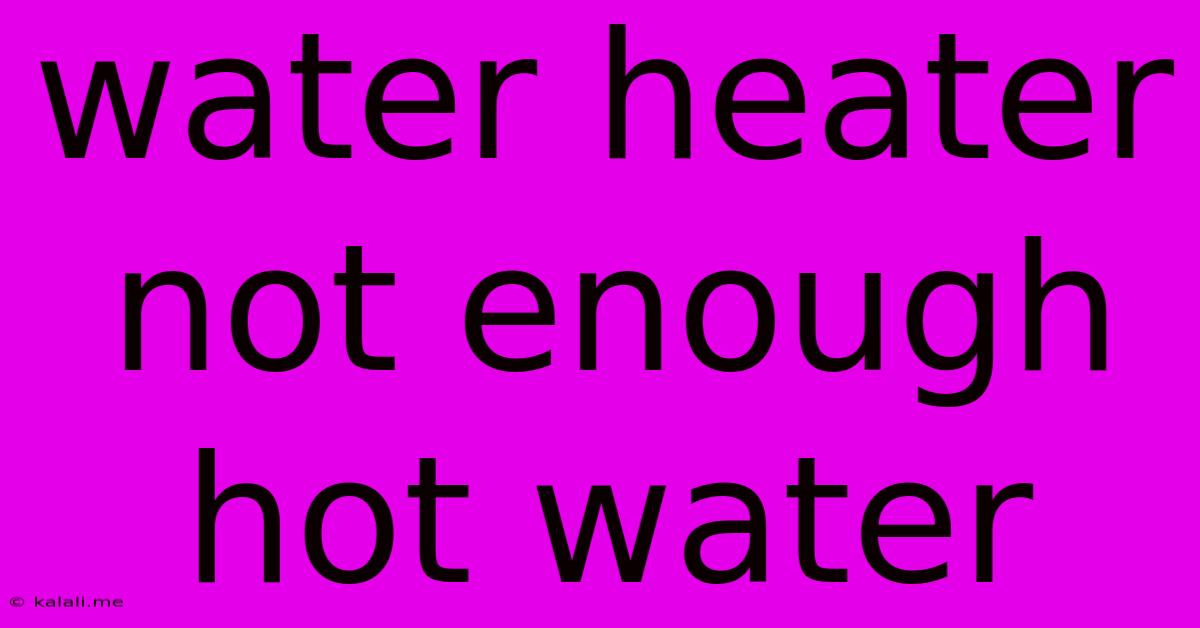Water Heater Not Enough Hot Water
Kalali
May 21, 2025 · 4 min read

Table of Contents
Not Enough Hot Water? Troubleshooting Your Water Heater Problems
Is your shower turning lukewarm before you've even worked up a lather? Are your dishes only getting a tepid rinse? A lack of hot water is a frustrating problem, but thankfully, most issues are easily diagnosed and fixed. This guide will walk you through the common culprits behind insufficient hot water and offer solutions to get your home flowing with hot water again. We'll cover everything from simple fixes to when you might need to call a professional.
Understanding Your Water Heater's Capacity
Before diving into troubleshooting, let's establish a baseline. How much hot water should you expect? This depends heavily on your water heater's size (typically measured in gallons) and the number of people in your household. A smaller family might find a 40-gallon tank sufficient, while a larger family might need a 50-gallon or even 80-gallon unit. Consider your daily hot water usage patterns: longer showers, frequent laundry, and dishwasher use all contribute to higher hot water demand. If your usage consistently outpaces your tank's capacity, upgrading to a larger tank might be necessary.
Common Causes of Insufficient Hot Water:
Here are some of the most frequent reasons why you might be experiencing a shortage of hot water:
1. Sediment Buildup:
Over time, mineral deposits accumulate at the bottom of your tank. This sediment acts as insulation, reducing the efficiency of heat transfer and leading to less hot water. Regular flushing of your water heater is crucial to remove this buildup. This involves draining a portion of the water from the tank to remove the sediment. Consult your water heater's manual for specific instructions, as the procedure varies slightly depending on the model.
2. Faulty Thermostat:
The thermostat controls the water temperature. If it malfunctions, it might not be heating the water to the desired temperature or might be cycling on and off erratically. This can lead to inconsistent hot water supply. A simple thermostat replacement might resolve this issue.
3. Leaking Dip Tube:**
The dip tube guides cold water into the bottom of the tank. If this tube cracks or breaks, cold water mixes with hot water, reducing the overall hot water supply. Replacing the dip tube usually requires some plumbing experience.
4. Heating Element Issues (Electric Water Heaters):
Electric water heaters utilize one or more heating elements to heat the water. A faulty or failing heating element will significantly impact your hot water output. You may need to replace the heating element; this is a relatively straightforward repair for those with basic electrical knowledge, but always prioritize safety. Turn off the power supply before working on any electrical components.
5. Gas Burner Problems (Gas Water Heaters):
For gas water heaters, problems with the gas burner, pilot light, or igniter can prevent proper water heating. A weak flame or a pilot light that keeps going out indicates a problem that likely requires a professional gas technician for repair. Never attempt gas appliance repairs unless you are qualified and experienced in gas plumbing.
6. Insufficient Insulation:**
Improper insulation around the water heater tank can lead to heat loss, resulting in less hot water and higher energy bills. Adding extra insulation (following manufacturer’s instructions and safety guidelines) can help improve efficiency.
7. Water Leaks:**
A slow leak from your water heater will eventually reduce the amount of hot water available. Regularly inspect your tank for any signs of leaks and address them immediately. Ignoring leaks can lead to more extensive damage.
When to Call a Professional:
While many of these issues can be addressed with DIY solutions, it's crucial to know your limits. If you are uncomfortable working with electricity or gas appliances, or if you are unsure about the cause of the problem, it is always best to call a qualified plumber or appliance repair technician. Attempting repairs beyond your skill level could lead to damage or injury.
By systematically investigating these potential problems, you can pinpoint the cause of your low hot water woes and restore your home's comfort. Remember, regular maintenance, including flushing the tank and checking for leaks, can prevent many issues from arising in the first place.
Latest Posts
Latest Posts
-
Does Cats Talk To Each Other
May 21, 2025
-
Can You Take A Swiss Army Knife On A Plane
May 21, 2025
-
Do Protestants Believe In The Trinity
May 21, 2025
-
Could I Ask You A Question
May 21, 2025
-
Send Control Alt Delete Remote Desktop
May 21, 2025
Related Post
Thank you for visiting our website which covers about Water Heater Not Enough Hot Water . We hope the information provided has been useful to you. Feel free to contact us if you have any questions or need further assistance. See you next time and don't miss to bookmark.